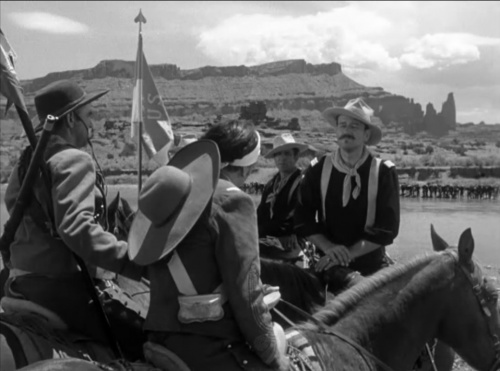

By Mike Wilmington Wilmington@moviecitynews.com
Wilmington on DVDs: Rio Grande
CO-PICK OF THE WEEK: CLASSIC
RIO GRANDE (Three and a Half Stars)
U.S.: John Ford, 1950 (Olive/Paramount/Republic)

A vintage Western from the acknowledged master, John Ford, Rio Grande was the third and last of Ford’s celebrated Cavalry Trilogy — coming right after Fort Apache (1948) and She Wore a Yellow Ribbon (1949). A capstone to the series, this movie once again stars John Wayne, who once again plays a gallant, tough but troubled U. S. cavalry leader.
This time he’s Lt. Col. Kirby Yorke, seemingly an older version of Captain Kirby York without the final “e‘), the part he played in Fort Apache. And the movie splits its (and Kirby’s) attention between Yorke’s problems with the local Apaches, who‘ve been on raiding missions near the Rio Grande (or Rio Bravo) border, and his family squabbles with fiery wife Kathleen (played by fiery Maureen O’Hara), and stubborn son Jeff (played by Claude Jarman, Jr., the deer-loving boy in The Yearling), who‘s left officer school and enlisted as a trooper in the cavalry.

O’Hara’s Kathleen is there to rescue Jeff, while Yorke, understandably torn, feels obligated to play no favorites, even as he‘s also drawn to try to repair his marriage. Providing a lusty background are these Fordian stalwarts: Victor McLaglen as blustering Sgt. Quincannon, Ben Johnson as expert horseman Trooper Travis Tyree, and Harry Carey, Jr. as amiable sidekick Trooper Daniel “Sandy” Boone.
McLaglen and Johnson also played characters named Quincannon and Tyree in She Wore a Yellow Ribbon, where Wayne was the much older Capt. Nathan Brittles. But those soldiers don’t seem related to their counterparts in Rio Grande, any more than Sandy is connected to the legendary pioneer Daniel Boone, unless the writers and Ford are tapping into some Philip Dick-style alternate universe. Most of the soldiers and Kathleen are haunted by memories of the Civil War: Tyree keeps calling neophyte Jeff “Johnny Reb,“ and J. Carroll Naish pops up as Yankee General Phil Sheridan.
Even aord buffs and aficionadoes, Rio Grande has often been the least the three cavalry films — perhaps because it was shot quickly as a favor to Republic Pictures so Ford could go to Ireland and make for them his longtime pet project, The Quiet Man. But it’s also perhaps because the script, by studio vet James Kevin McGuiness (who died in 1950, the year Rio Grande was released), isn’t as good as the ones Frank S. Nugent and Laurence Stallings wrote for the other two. (All three movies are based on stories by James Warner Bellah, the man who wrote the screenplay for Ford’s masterpiece The Man Who Shot Liberty Valance,)
The mood and style of Rio Grande are more relaxed and easy-going and full of tomfoolery than the tensely dramatic, revisionist Fort Apache, and less lyrical and funny/sad than the elegiac She Wore a Yellow Ribbon. The beautiful black and white photography is by Bert Glennon, Victor Young wrote the music (as he later did, memorably, for The Quiet Men), and The Sons of the Pioneers (including Ken Curtis), wander around the campsite in a charmingly unmotivated way, singing harmonious western ballads.
Rio Grande may be the last and least of the Ford Cavalry Trilogy, but that’s a little like saying it’s the least shiny of the crown jewels. Any true Ford fan will love it. Wayne, who had been a star of some sort ever since Raoul Walsh’s The Big Trail in 1930, became a front row superstar in the years between 1948’s Fort Apache and 1952’s The Quiet Man, when he began showing his age and temper more, and Kirby Yorke (or York), is one of the Duke’s archetypal roles.
One can feel him taking command of the screen, even as Lt. Col. Yorke takes command of his men — and he demonstrates with extreme effectiveness that most crucial quality Wayne always claimed Ford had taught him about movie acting: He listens to the other characters, acts as well as reacts. That’s not as easy or as common as it sounds — though it’s easier when you have a fellow cast that includes the likes of O‘Hara, McLaglen, Naish, Johnson, Carey, Chill Wills and Wayne’s own son, Pat. The movie just missed being called Rio Bravo, a title Ford’s friend and colleague Howard Hawks later picked up.

Extras: Documentary The Making of Rio Grande, hosted by Leonard Maltin, and including interviews with Ben Johnson, Harry Carey, Jr. and Michael Wayne; Trailer.













